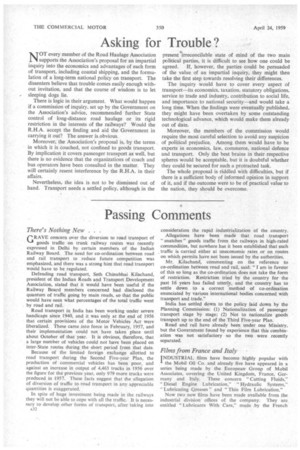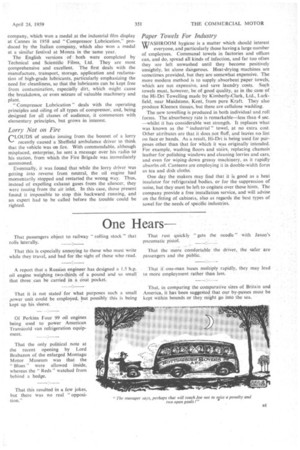Passing Comments
Page 34

Page 35

If you've noticed an error in this article please click here to report it so we can fix it.
There's Nothing New . . .
("RAVE concern over the diversion to road transport of goods traffic on trunk railway routes was recently expressed in Delhi by certain members of the Indian Railway Board. The need for co-ordination between road and rail transport to reduce future competition was emphasized, and there was a strong hint that road transport would have to be regulated.
Defending road transport, Seth Chinubhai Kilachand, president of the Indian Roads and Transport Development Association, stated that it would have been useful if the Railway Board members concerned had disclosed the quantum of traffic going by main roads, so that the public would have seen what percentages of the total traffic went by road and rail.
Road transport in India has been working under severe handicaps since 1940, and it was only at the end of 1956 that certain provisions of the Motor Vehicles Act were liberalized. These came into force in February, 1957, and their implementation could not have taken place until about October of that year. It is obvious, therefore, that a large number of vehicles could not have been placed on inter-State routes during the short period from that date. Because of the limited foreign exchange allotted to road transport during the Second Five-year Plan, the production of commercial vehicles has been poor, and against an increase in output of 4,463 trucks in 1956 over the figure.for the previous year, only 979 more trucks were produced in 1957. These facts suggest that the allegation of diversion of traffic to road transport in any appreciable quantities is exaggerated.
In spite of huge investment being made in the railways they will not be able to cope with all the traffic. It is necessary to develop other forms of transport, after taking into consideration the rapid industrialization of the country.
Allegations have been made that road transport " snatches " goods traffic from the railways in high-rated commodities, but nowhere has it been established that such traffic is carried either at uneconomic rates or on routes on which permits have not been issued by the authorities.
Mr. Kilachand, commenting on the reference to co-ordination between road and rail, said: "I am in favour of this so long as the co-ordination does not take the form of restriction. Restriction tried by the country for the past 16 years has failed utterly, and the country has to settle down to a correct method of co-ordination enunciated by various international bodies concerned with transport and trade."
India has settled down to the policy laid down by the Planning Commission: (1) Nationalization of passenger transport stage by stage; (2) Not to nationalize goods transport up to the end of the Third Five-year Plan.
Road and rail have already been under one Ministry, but the Government found by experience that this combination was not satisfactory so the two were recently separated.
Films from France and Italy
INDUSTRIAL films have become highly popular with A the Mobil Oil Co. and already five have appeared in a series being made by the European Group of Mobil Associates, covering the United Kingdom, France, Germany and Italy. These concern "Cutting Fluids," "Diesel Engine Lubrication," "Hydraulic Systems," "Lubricating Greases" and "Thin Film Lubrication."
Now two new films have been made available from the industrial division offices of the company. They are entitled "Lubricants With Care," made by the French
company, which won a medal at the industrial film display at Cannes in 1958 and "Compressor Lubrication," produced by the Italian company, which also won a medal at a similar festival at Monza in the -same year.
The English versions ofboth were completed by Technical and Scientific Films, Ltd. They are most comprehensive and excellent. The first deals with the manufacture, transport, storage, application and reclamation of high-grade lubricants, particularly emphasizing the need for cleanliness, so that the lubricants can be kept free from Contamination, especially dirt, which might cause the breakdown, or even seizure of valuable machinery and plant.
"Compressor Lubrication" deals with the operating principles and oiling of all types of compressor, and, being designed for all classes of audience, it commences with elementary principles, but grows in interest.
CLOUDS of smoke issuing from the bonnet of a lorry recently .caused a Sheffield ambulance driver to think that the vehicle was on fire. With commendable, although misplaced, enterprise, he sent .a message over his radio to his station, from which the Fire Brigade was immediately summoned.
Eventually, it was found that while the lorry driver was getting into reverse from neutral, the oil engine had momentarily stopped and restarted the wrong way. Thus, instead of expelling exhaust gases from the silencer, they were issuing from the air inlet. In this case, those present found it impossible to stop this backward running, and an expert had to be called before the trouble could be righted.
Paper Towels For Industry
WASHROOM hygiene is a matter which should interest everyone, and particularly those having a large number of employees. Communal towels in factories and offices can, and do, spread all kinds of infection, and far too often they are left unwashed until they become positively unsightly, let alone dangerous. Heat-drying,machines are sometimes provided, but they are somewhat expensive. 'The more modern method is to supply absorbent paper towels, which are not expensive, and save laundry costs. Such towels must, however,, be of good quality, as in the case of the Hi-Dri Towelling made, by Kimberly-Clark, Ltd., Larkfield, near Maidstone„ Kent, from pure Kraft. They also produce Kleenex tissues, but these are cellulose wadding.
The new towelling is produced in both individual and roll forms. The absorbency rate is remarkable—less than 4 sec. —whilst it has considerable wet strength. It replaces what was known as the "industrial " towel, at no extra cost. Other attributes are that it does not fluff, and leaves no lint on face or hands. As a result, Hi-Dri is being used for purposes other than that for which it was originally intended. For example, washing floors and stairs, replacing chamois leather for polishing windows and cleaning lorries and cars, and even for wiping-down greasy machinery, as it rapidly absorbs oil. Canteens are employing it in double-width form as tea and dish cloths: One day the makers may find that it is good as a heat insulator for refrigerated bodies, or for the suppression of noise, but they must be left to cogitate over those hints. The company provide a free installation service, and will advise on the fitting of cabinets, also as regards the best types of towel for the needs of specific industries.




































































































